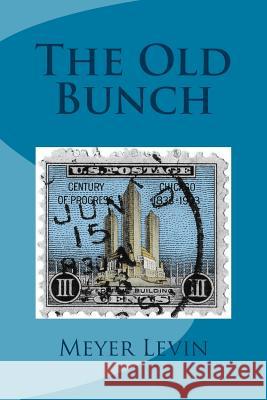The Old Bunch » książka
The Old Bunch
ISBN-13: 9780692234600 / Angielski / Miękka / 2014 / 674 str.
Meyer Levin was a Chicago-born Jewish author. His best-known book is "Compulsion," which is a novelization of the notorious Loeb and Leopold murder case of 1924. Levin was in a special position to tell the story, because he was personally acquainted with the perpetrators. Levin is also famous for bringing Anne Frank's diary to light. But "The Old Bunch" may be his greatest work.
"The Old Bunch" was written in the mid-1930's, and it tells the tales of the kids of a Chicago Jewish ghetto coming of age and stepping out into the world. It's presumably something of a fantasy autobiography, echoing Levin's own adventures -- Levin was born in 1905, and the events in this book take place beginning in the year 1921 (when the "bunch" is graduating from school), and running through to 1934.
The book is compelling for its individual stories and for its living window into times past. Because it was written prior to the horrors of WWII, it's a very pure view of the pre-war era. (Anything written later will necessarily be done with hindsight, and will likely de-emphasize "unimportant" details in favor of those that connect to major war events.) But the history is merely a fascinating byproduct of the vivid human stories that fill the pages.
"The Old Bunch" is surprisingly unknown today, which is a shame. This really is one of the great novels, in a class with Tolstoy and Steinbeck. It conveys the entirety of the era: The people, the culture, the economics, Chicago politics (very dirty ), with a global perspective as well (some characters travel to Europe and Palestine). It covers the Roaring Twenties, Prohibition, the Great Depression, and the New Deal. To read the book is to live and breathe in these bygone days.
Most importantly, Meyer Levin depicts events without agenda or judgment. Characters may be Democrats or Republicans or workers or bosses or religionists or atheists or many other things, but all are portrayed with depth, and none are simple heroes or villains or symbols. These are, in the end, tales about the very personal and individual transitions to adulthood, and the elusive quest for wisdom. It is the same challenge that every generation must face.
"The Old Bunch" was critically acclaimed and went through numerous print editions, but it eventually passed into the public domain and was temporarily forgotten. A "Wall Street Journal" article in 2012 ("Destiny's Children," by Joseph Epstein) sparked a revival of interest, and Rancho Lazarus Publications is proud to present a new edition, accurately rendered and true to the original text, and with the addition of occasional footnotes to clarify details of historical accuracy that the modern reader may not have on tap. With almost 700 pages of text (the original hardback book ran to almost 1000 pages), this is an epic novel. But far from being overlong, it's the sort of reading that leaves you wishing there was more.
"Written in good hard-driving colloquial prose, full of sharp characterizations. . . A very fine novel." -- "New Republic"
"A landmark -- vivid and exciting reading. It brilliantly succeeds in taking the reader on a memorable tour of the world in which the old bunch lived." -- "The New York Times"











